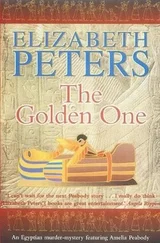"Radcliffe," he said urgently. "You are alarming this lady. I beg you- "
"I am not at all alarmed," I said calmly. "Except for your friend's health. He seems about to have a fit. Is he commonly subject to weakness of the brain?"
The younger man now had both hands on his companion's shoulders. He did not seem concerned; indeed, he was smiling broadly. He was an attractive young fellow; from the way Evelyn looked at him I suspected she shared my opinion.
"My brother, madam, not my friend," he said cheerfully. "You must forgive him- now Radcliffe, calm yourself. The museum always has this effect on him," he explained, looking at me. "You must not blame yourself for upsetting him."
"I certainly should not blame myself if my harmless behavior brought on such a violent, inexcusable breach of common courtesy- "
"Amelia!" Evelyn caught my arm as a roar of rage burst from the bearded person. "Let us all be calm, and not provoke one another."
"I am not provoking anyone," I said coolly. Evelyn exchanged a glance with the young man. As if some message had passed between them, they both moved, the young fellow tugging at his agitated brother, Evelyn using a gentler but equally firm grip to pull me away. The other visitors were watching us with ill-bred curiosity. One lady pulled her companion out of the room. Another couple followed, leaving a single spectator, an Arab in flowing robes, headcloth, and bright-green goggles, who continued to watch the antics of the incomprehensible foreigners with amused contempt.
Rapid footsteps in the hall heralded the arrival of M. Maspero, who had apparently been alarmed by the uproar. When he saw us his pace slowed, and a smile spread over his face.
" Ah, c'est le bon Emerson. I should have known. You have met one another? You are acquainted?"
"We are not acquainted," said the person called Emerson, in a slightly modified shout. "And if you make any attempt to introduce us, Maspero, I shall fell you to the ground!"
M. Maspero chuckled. "Then I will not risk it. Come, ladies, and let me show you some of our finer objects. These are unimportant- a miscellany only."
"But they are most interesting," Evelyn said in her gentle voice. "I admire the soft colors of the jewelry."
"Ah, but these trinkets are not valuable- no gold, only beads and amulets, made of faience, common as sand. We find such bracelets and necklaces by the hundreds."
"Faience?" Evelyn repeated. "Then the lovely coral, the delicate blue-green which resembles turquoise, are not the real stones?"
The black-bearded male person had turned his back on us and was pretending to sneer at a collection of ushebtis; I knew he was eavesdropping, however. His brother was not so rude. The young fellow stood looking shyly at Evelyn, and when she asked about the jewelry he started to answer. The ebullient Maspero anticipated him.
" Mais non , mademoiselle , they are imitations of coral, turqoise, lapis lazuli, made from a colored paste common in ancient Egypt."
"They are lovely, all the same," I said. "And the very age of them staggers the imagination. To think that these beads adorned the slim brown wrist of an Egyptian maiden four thousand years before our Saviour was born!"
Blackboard whirled around. "Three thousand years," he corrected. "Maspero's chronology, like all his work, is inexcusably inaccurate!"
Maspero smiled, but I think his next act was prompted to some extent by the annoyance he was too courteous to express directly. Lifting a necklace of tiny blue and coral beads, he handed it to Evelyn with a courtly bow.
"Keep it as a memento of your visit, if you treasure such things. No, no"-he waved away Evelyn's protests-"it is of no consequence; I only regret I have nothing finer for such a charming lady. For you, too, Mademoiselle Peabody" – and another string of beads was pressed into my hand.
"Oh, but- " I began, with an uneasy glance at the black-bearded person, who was shaking like an engine about to burst.
"Do me the honor," Maspero insisted. "Unless you fear the foolish tales of curses and avenging Egyptian ghosts- "
"Certainly not," I said firmly.
"But what of the curses of M. Emerson?" Maspero asked, his eyes twinkling. " Regardez - he is about to say unkind things to me again."
"Never fear," Emerson snarled. "I am leaving. I can only stand so many minutes in this horror house of yours. In God's name, man, why don't you classify your pots?"
He rushed off, pulling his slighter companion with him. The young fellow turned his head; his gaze went straight to Evelyn and remained fixed on her face until he had been removed from the room.
"He has almost the Gallic temperament," said Maspero admiringly. "One observes the magnificence of his rages with respect."
"I cannot agree with you," I said. "Who is the fellow?"
"One of your fellow countryman, dear lady, who has interested himself in the antiquities of this country. He has done admirable work excavating, but I fear he does not admire the rest of us. You heard his abuse of my poor museum. He abuses my excavation methods with the same ardor. But, indeed, there is no archaeologist in Egypt who has been spared his criticism."
"I don't care to speak of him," I said, with a sniff. "We think your museum is fascinating, M. Maspero," Evelyn added tactfully. "I could spend days here."
We spent several hours more inspecting the exhibits. I would not have said so for the world, but I felt a certain sympathy for the odious Emerson's criticisms. The exhibits were not arranged as methodically as they might have been, and there was dust everywhere.
Evelyn said she was too tired to go down to the boat that day, so we took a carriage back to the hotel. She was pensive and silent during the drive; as we neared Cairo, I said slyly,
"Mr. Emerson's young brother does not have the family temper, I believe. Did you happen to hear his name?"
"Walter," said Evelyn, and blushed betrayingly.
"Ah." I pretended not to notice the blush. "I found him very pleasant. Perhaps we will meet them again at the hotel."
"Oh, no, they do not stay at Shepheard's. Walt-Mr. Walter Emerson explained to me that their money all goes for excavation. His brother is not supported by any institution or museum; he has only a small yearly income and, as Walter says, if he had the wealth of the Indies he would consider it insufficient for his purposes."
"You seem to have covered quite a lot of ground in a very short time," I said, watching Evelyn out of the corner of my eye. "It is a pity we can't continue the acquaintance with the younger Mr. Emerson, and avoid his insane brother."
"I daresay we shall not meet again," Evelyn said softly.
I had my own opinion on that score.
In the afternoon, after a rest, we went to shop for medical supplies. The guidebooks advise travelers to carry a considerable quantity of medicines and drugs, since there are no doctors south of Cairo. I had copied the list of suggested remedies from my guide, and was determined to do the thing properly. If I had not been a woman, I might have studied medicine; I have a natural aptitude for the subject, possessing steady hands and far less squeamishness about blood and wounds than many males of my acquaintance. I planned to buy a few small surgical knives also; I fancied I could amputate a limb- or at least a toe or finger- rather neatly if called upon to do so.
Our dragoman, Michael, accompanied us. I thought he seemed quieter than usual, but I was occupied with my list: blue pills, calomel, rhubarb, Dover's powder, James's powder, carbolic acid, laudanum, quinine, sulfuric acid, ipecacuanha… It was Evelyn who asked Michael what the trouble was. He hesitated, looking at us in turn.
"It is my child, who is ill," he said finally. "She is only a girl-child, of course."
Читать дальше








